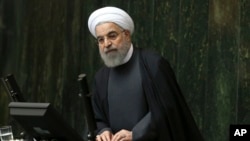Iranian President Hassan Rouhani says the Islamic republic has entered a "new chapter" in its history in a speech Sunday praising the end of international sanctions imposed over Iran's nuclear activities.
The United States and other world powers lifted oil and economic sanctions Saturday after the International Atomic Energy Agency certified that Tehran complied with the terms of an agreement reached in Vienna last July after nearly two years of intense negotiations. The terms included shipping almost all of Iran's nuclear fuel out of the country, dismantling and removing its nuclear equipment, and providing international inspectors greater access to its nuclear facilities.
In addition to ending the sanctions, Iran would have access to billions of dollars of assets in foreign banks that have been frozen for years.
Kerry says entire world safer
U.S. Secretary of State John Kerry said "our friends and allies in the Middle East, and the entire world are safer because the threat of the nuclear weapon has been reduced."
But the impact of Iran’s sanctions relief will be limited in the United States, said Kelsey Davenport, the director of nonproliferation policy at the Arms Control Association.
“A number of sanctions on human rights, on terrorism will remain in place that will make it very difficult for companies to navigate,” she said
U.N. Secretary-General Ban Ki-moon called Saturday's announcement a "significant milestone."
Flashpoints remain
Although implementation will open the door to some trade between the U.S. and Iran, it will not result in the U.S. overlooking other areas of concern about Tehran, said State Department spokesman Mark Toner.
“None of us have rose-colored glasses on,” said Toner. “None of us believe that suddenly once we reach Implementation Day that a whole new world is going to open up and we are suddenly going to cooperate with Iran,” he said.
Those areas of concern include Iran’s recent ballistic missile tests and its firing of rockets near a U.S. military ship, in December.
News of "Implementation Day" was greeted with skepticism by Israeli Prime Minister Benjamin Netanyahu, the most vocal opponent of the deal in the international community. He warned that "Iran has not relinquished its ambition to obtain nuclear weapons, and continues to act to destabilize the Middle East and spread terror throughout the world."
The end of sanctions was also greeted with scorn in the United States by many of President Barack Obama's Republican opponents, especially the party's 2016 presidential candidates.
"It seems to be an indication of where we are going. That Iran deal is the dumbest deal I think I’ve ever seen," said Republican presidential candidate Donald Trump at a recent campaign event.
Rouhani dismissed the criticism during his speech to the Iranian parliament. He said everyone was happy "except Zionists, warmongers fueling discord in the Islamic world, and hardliners in the U.S."
The deal is a triumph for Rouhani, considered a moderate cleric who was elected in 2013 on a pledge to reform his country’s economy. But Tehran's hopes of an instant windfall by its return to the global oil markets will likely be tempered due to the massive glut of oil, which dropped to $30 per barrel this week for the first time in a decade.
Some material for this report came from AP, AFP and Reuters.




